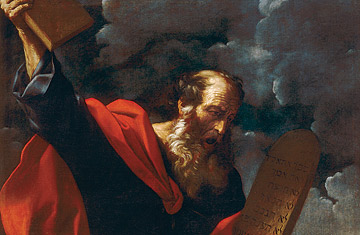
The Ten Commandments teach that freedom depends on law.
(3 of 3)
But it was Cecil B. DeMille who turned Moses into a symbol of American power in the Cold War. The 1956 epic The Ten Commandments, which in its inflation-adjusted total ranks as the fifth highest grossing movie of all time, opened with DeMille appearing onscreen. "The theme of this picture is whether men ought to be ruled by God's law or whether they are to be ruled by the whims of a dictator," he said. "The same battle continues throughout the world today." To drive home his point, DeMille cast mostly Americans as Israelites and Europeans as Egyptians. And in the film's final shot, Charlton Heston adopts the pose of the Statue of Liberty and quotes the line from the third book of Moses — Leviticus — inscribed on the Liberty Bell: "Proclaim liberty throughout all the land unto all the inhabitants thereof."
To modern Americans, Moses' heartbreak, in many ways, ensures his ongoing appeal. Though a champion of freedom, he was also a prophet of disappointment. After leading the Israelites for 40 years, Moses is denied entry to the promised land for disobeying God. No one understood this aspect of the Moses story better than Martin Luther King Jr. In his first national speech, in 1956, he likened the U.S. Supreme Court to Moses for splitting the Red Sea of segregation. On the night before his death 12 years later, King predicted he would not fulfill his dream. "I've been to the mountaintop," he declared. "And I've looked over. And I've seen the promised land. And I may not get there with you, but I want you to know tonight that we as a people will get to the promised land." Both Moses and King are reminders that even the greatest leaders fall short.
So what lessons can the current occupant of the White House learn from a figure that nearly every one of his predecessors has invoked?
First, sell the milk and honey. Obama is the first President to hold a Passover seder in the White House, but he seems to be forgetting the main point of the service: the story of Moses is, above all, a story. It's a narrative of hope. Details are fine for negotiating policy, but it's the vision of milk and honey that gets people to plunge into the Red Sea.
Second, remember the Nile. As he wrestles with whether to tackle immigration, toughen regulations or insure all Americans, the President should recall that from the moment God hears his people moaning under slavery, the entire moral focus of the Moses story is to build a society that nurtures everyone. Thirty-six times, the Torah urges the Israelites to befriend the stranger, for they were strangers in Egypt.
Third, the one on Sinai takes the heat. The Bible outlines at least a dozen rebellions in which the people attempt to overthrow Moses. In a striking parallel to Obama, the Israelites even question Moses' birthright: "Who made you leader over us?" God offers to destroy the people, but Moses brokers a compromise. The strongest leaders face the harshest criticism and hold fast against their naysayers.
Finally, you may not enter the promised land. Forced to die across the Jordan on Mount Nebo, Moses confronts his final choice: Will he fight or prepare the Israelites for the future? He chooses the latter. "I have put before you this day life and prosperity, death and adversity," he says. "Choose life."
These words capture what may be the most trying lesson of leadership: You may fail, but your legacy is to prepare your followers to succeed without you. So plunge into the waters, persevere through the dryness, and don't be surprised if you don't reach your goal. For the true destination is not this year at all, but next.
Feiler is the author of America's Prophet: Moses and the American Story, from which this article is adapted
